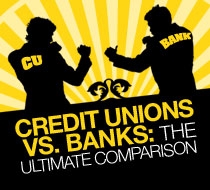//The Credit Union Difference: In-Depth
From low loan rates and great savings earnings, to free services and convenient access to your money, credit unions provide consumers with an excellent way to manage their money.
However, many people do not know what a credit union is, or even know that they’re probably eligible to join one right now. Here is information to help you understand the credit union difference, and how becoming a credit union member is a great step toward living a financially healthy life.
Membership means ownership. When you join a credit union, you actually become part-owner. Each credit union member has equal ownership and one vote — regardless of how much money a member has on deposit. Each credit union is governed by a board of directors, elected by and from the credit union's membership. Board members serve on a strictly volunteer basis.
Not-for-profit, but for service. Credit unions are not-for-profit cooperatives. They return profits to their members in the form of higher dividends on savings, lower rates on loans and conveniently priced products and services — instead of distributing profits to stockholders like banks and other financial service providers.
Social Purpose: People Helping People. Credit unions exist to help people, not make a profit. The goal of every credit union is to serve all their members, regardless of how much money they make. Credit union members are loyal for this reason. They know their credit union will be there for them in bad times, as well as good. The same people-first philosophy causes credit unions to get involved in community charitable activities and worthwhile causes. Credit unions also provide much-needed financial education to assist members to become better- educated consumers of financial services.
Who can join a credit union? By current federal law, credit unions cannot serve the general public. People may qualify for a credit union membership through their employer, organizational affiliations like churches or social groups, or a community-chartered credit union.
Back to Articles











